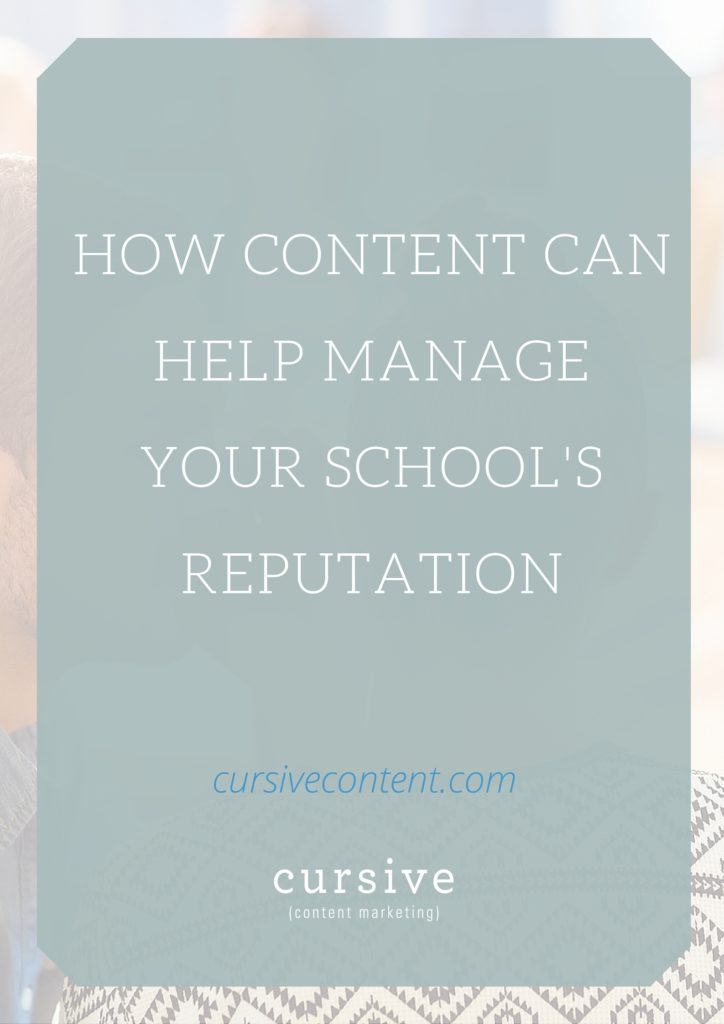How Content Can Help Manage Your School’s Reputation
The party school. The sports-crazed university. The stodgy academy. The one with famous alums but less-than-stellar financial aid.
Does it matter what people say about you?
Somewhere along the way, every school gets a reputation.
Sometimes these reputations are earned, other times it is impossible to track down exactly why assumptions and misinformation have transformed into pervasive rumor.
Sometimes what’s said about you is good. Other times you’re in charge of efforts to clear up the negative image of your school.
You need something that can help resolve– and even head off– negative perceptions about your school.
You need great content.

What do people do when they want to know something? They Google it. Your website, blog, and social media accounts appear in search results, and you are largely in control of their content.
Hellooooo, opportunity.
All the content on the internet works together to provide substance on which people can base their opinions. Wouldn’t you prefer they get their information from content you produce?
By consistently publishing relevant, informative content of your own, you can:
- boost your positive reputation
- correct misperceptions
- banish unwanted content to a higher search engine results page
- build a substantial online presence for your school
- attract your ideal student
Here’s what this might look like in action:
Content can help counteract or even completely refute falsehoods and rumors.
If there’s an untruth about your school that’s being perpetuated, you need to use the resources available to you to negate the rumors.
For example, let’s say your school has developed a reputation for having poor financial aid packages—and let’s say that rumor is unfair and untrue. You can use content to combat it:
- Write a blog post that demystifies the financial aid process.
- Create an infographic with stats on financial aid (including your own impressive offerings).
- Talk with past students who received financial aid. Find out what the best and most difficult parts of the process were. Gather quotes and stories about how the financial aid they received impacted their education. Create content that addresses the needs of future students and helps them feel confident that your school will offer them a competitive aid package.
- Review your website content to see what information might be confusing or misleading. Rewrite content as needed so it is clear, direct and helpful. Include stats and student quotes that support your assertions. Look for opportunities to mention your fantastic aid packages throughout the site, not just on the financial aid page.
Content can help you uncover what’s being said about you.
Before social media, the last person to hear a rumor was the person the rumor is about.
That no longer has to be the case. In fact, it shouldn’t be the case.
You can read, hear and watch what is being said about you AND you have the ability to respond.
How amazing is that?! If someone has the wrong idea about your school, not only do you get the chance to know what they said, you get a chance to clear the air. It’s a great opportunity, because you can refute a falsehood with facts, and responding in a friendly and appropriate way can help boost your brand in the eyes of your audience.
Schools have done amazing things with this ability.
It shows you’re savvy (because you know what’s being said about you) and approachable (because you’re not just shutting down comments that you don’t like) and smart (because you’re taking the time to respond).
Exactly how you respond is extremely important. You don’t want to be defensive, uptight or angry. Try to present facts with a smile.
For example, if someone leaves a comment on your Facebook page blasting your financial aid packages, you don’t want to ignore it or respond negatively.
Instead of saying:
“That’s not true. We offer many financial aid options.”
Try saying:
“We understand the financial aid process can be frustrating at times. We’re proud to offer financial aid packages to X% of our students and hope that you can be one of them. Please give our Financial Aid office a call at [phone number] to discuss options that might be available to you.”
The first response comes across as defensive and doesn’t do anything to change the commenter’s opinion. The second response is sympathetic, factual and helpful. It is much more likely to elicit a positive response from the person who commented—and likely to garner respect from the rest of your audience.
The goal of publishing great content isn’t just about reputation control, of course. It’s also about creating content that is useful to your audience and compels them to stay connected to you.
Over time, you will influence a positive perception of your school and attract more ideal students.
So yes, it matters what people think about you. But it matters more what you do about it.
Ready to put a content plan in action? Get started with these helpful posts:
- The Essential Editorial Calendar for Schools [Free Template]
- School Website Content Updates to Squeeze Into Your Summer Schedule
- From Interested to Enrolled: How to Create Content for Every Step of the Journey
MORE ARTICLES
-
 Busy, Scattered, Exhausting: What’s Really Wrong With Your School Marketing
Busy, Scattered, Exhausting: What’s Really Wrong With Your School Marketing -
 Why Most Schools Don’t Actually Have a Clear Story
Why Most Schools Don’t Actually Have a Clear Story -
 Clarity in 50 Words or Less: How to Write Your School’s One-Sentence Story
Clarity in 50 Words or Less: How to Write Your School’s One-Sentence Story -
 What Should Your School Do with Its Blog Now That AI Is Changing Search?
What Should Your School Do with Its Blog Now That AI Is Changing Search? -
 What Is Your Private School’s Bold & Unifying Big Promise?
What Is Your Private School’s Bold & Unifying Big Promise? -
 AI Writing Prompts to Power Private School Storytelling
AI Writing Prompts to Power Private School Storytelling -
 When to Outsource Your Private School Content Marketing to an Expert
When to Outsource Your Private School Content Marketing to an Expert -
 3 Unique Ways to Attract Dream Families with Content
3 Unique Ways to Attract Dream Families with Content
